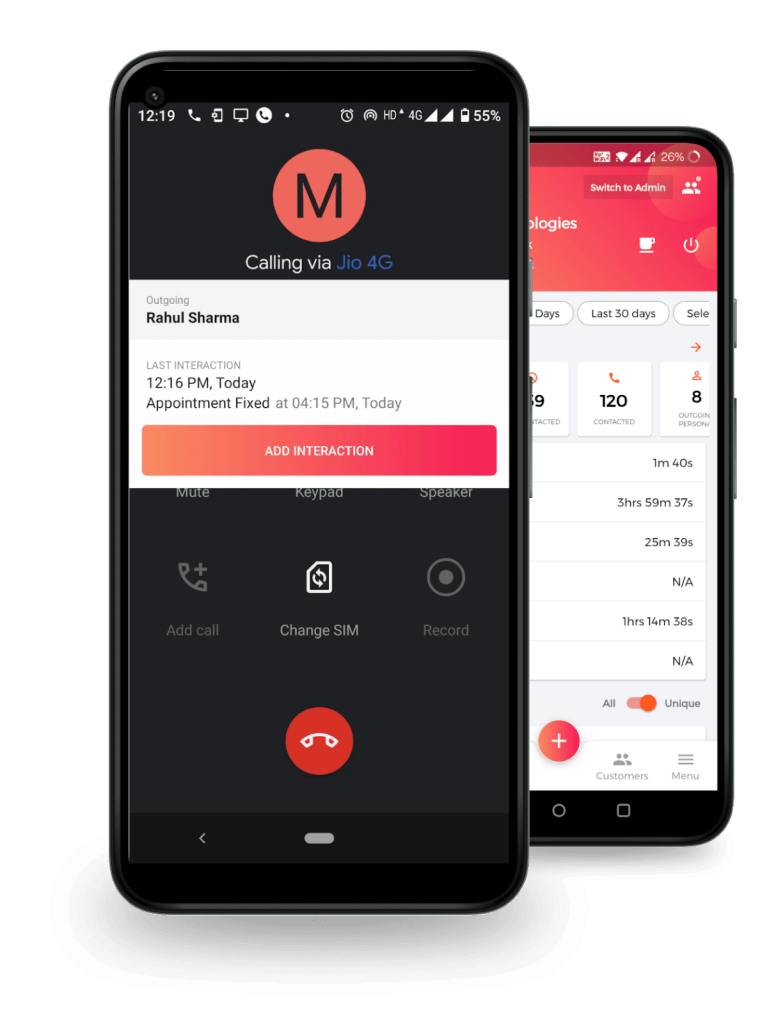Telecalling has become a crucial aspect of customer service and sales in the digital age. To excel in this role, telecallers must possess essential telecaller skills that go beyond technical knowledge.
Learning telecaller skills might sound simple. But when you start to learn and implement things then you’ll realize how tough it is. It can be similar to walking on a thin wall where on one side there’s a Well and on the other side there’s a Canon.
The job role of a telecaller might feel very steep at first. But if you’re determined enough you can reach the top of the telemarketing mountain & concur the telesales from the top. In this blog, we will explore the importance of these telecaller skills in telecalling and their impact on sales performance. And also help you with a few tips on how to learn soft skills for telecalling.
Who is a telecaller?
A telecaller is someone who talks to customers over the phone on behalf of a company. They handle customer inquiries, provide information about products or services, and try to sell or assist customers. Telecallers need good communication skills, the ability to understand customer needs and problem-solving skills.

Their job is to make customers feel comfortable and help them with any issues or questions they have. Acting as the voice of the company, they represent its values and offerings. And also strive to build positive relationships with customers. By being friendly, patient, and knowledgeable, telecallers aim to ensure customer satisfaction and contribute to the company’s success.
What are Telecaller Skills?
Skills for telecalling encompass a range of personal attributes and abilities that contribute to effective customer interactions and service delivery.
Let’s delve deeper into each of these Telecaller skills
Effective Communication with customers
Telecallers need to express themselves clearly, use appropriate language and tone, and actively listen to customers to ensure a smooth flow of information. Strong communication skills allow telecallers to articulate their message effectively, understand customer needs, and provide accurate and concise responses.
Active Listening
By attentively listening to customers’ concerns, telecallers can demonstrate empathy, identify underlying needs, and provide tailored solutions. Active listening involves paying attention to verbal and non-verbal cues, asking clarifying questions, and paraphrasing to ensure a thorough understanding of the customer’s situation.

Empathy
The ability to understand and relate to customers’ emotions and experiences allows telecallers to build trust, establish rapport, and provide compassionate support. Telecallers with empathy can put themselves in the customer’s shoes, acknowledge their feelings, and respond with genuine care and understanding.
Problem-Solving
Another area where a telemarketer must have is strong analytical skills to assess customer queries, identify the root cause of problems, and offer effective solutions promptly and efficiently. They need to think critically, gather relevant information, and apply logical reasoning to resolve customer issues effectively.
Adaptability
Adapting communication styles, approaches, and strategies to suit diverse customer preferences and situations enables telecallers to provide a personalized and satisfactory experience. Being adaptable allows telecallers to respond effectively to unexpected challenges. Adjust their approach based on customer feedback, and accommodate individual needs.
Positive Attitude
A positive and enthusiastic attitude helps telecallers create a welcoming environment, uplift customer moods, and foster long-lasting customer relationships. It radiates through their voice, words, and actions, leaving customers with a favorable impression and a sense of trust in the company.
Professionalism
Telecallers should adhere to ethical standards, maintain confidentiality, and exhibit professionalism through polite and respectful interactions with customers. Professionalism also involves being knowledgeable about the company’s products or services, following company guidelines, and representing the brand in a professional manner.
Patience
Demonstrating patience during challenging situations or when dealing with difficult customers allows telecallers to remain calm, provide accurate information, and resolve issues effectively. Patient telecallers can navigate through complex scenarios, manage customer frustrations, and ensure a positive customer experience.
Resilience
Resilience enables telecallers to bounce back from rejection or setbacks, persist in providing quality service, and maintain a positive mindset despite challenges. It helps telecallers stay motivated, learn from experiences, and continuously improve their telecaller skills.
Time Management
Efficiently managing time and multitasking help telecallers handle a high volume of calls. Respond promptly to customer inquiries, and ensure timely follow-ups, resulting in enhanced productivity and customer satisfaction. Telecallers who prioritize their tasks, set realistic goals, and manage their workload effectively can provide efficient and timely support to customers.
These are the 10 telecaller skills for success.
Tips on How to Learn Telecalling Skills
Seek specialized training
Look for training programs or workshops specifically designed to develop soft skills for telecalling. These programs provide comprehensive guidance on essential skills like effective communication, active listening, empathy, problem-solving, and more. By participating in such training, you can learn practical techniques, receive valuable feedback, and gain insights into the nuances of telecalling.
Engage in role-playing and practice
Actively engage in role-playing exercises to simulate real telecalling scenarios. These practice sessions allow you to refine your communication skills. Also, improve your ability to handle various customer situations and enhance your overall performance. By immersing yourself in these simulated interactions, you can practice active listening, problem-solving, adapting to different customer personalities, and delivering effective responses.

Learn from experienced telecallers
Seek guidance from experienced telecallers or mentors who have a wealth of knowledge and expertise in the field. Their experience can provide valuable insights into successful telecalling techniques, strategies for building rapport with customers, and tips for handling challenging situations. By observing their interactions and seeking their advice, you can gain valuable perspectives and learn from their proven methods.
Continuous learning
Stay updated with industry trends, best practices, and communication techniques relevant to telecalling. Read books, articles, and blogs that cover topics such as effective communication, customer service, emotional intelligence, and problem-solving. Attend webinars or online courses that focus on enhancing soft skills for telecalling. By staying informed and continuously expanding your knowledge, you can adapt to evolving customer needs, industry standards, and customer service expectations.
Enhance communication skills
Effective communication is at the core of telecalling success. To improve your communication skills, read books on effective communication, practice public speaking, and engage in writing exercises to refine your written communication abilities. Focus on clarity, tone, and using language that is appropriate for different customer situations. Additionally, practice active listening techniques to ensure you understand customer needs, concerns, and preferences accurately. By honing your communication skills, you can convey information clearly, build rapport with customers, and provide exceptional service.
Conclusion
Soft skills are essential in telecalling. They help establish connections, resolve issues, and drive sales. By investing in training and continuous improvement, telecallers can enhance their communication, empathy, and problem-solving abilities. Developing these skills sets them apart and leads to professional growth and success in the field. Embrace soft skills in telecalling for outstanding results.
One Telecaller app that can help Telemarketers
When it comes to telemarketing, strong soft skills are essential for executing your tasks. However, to truly maximize your sales potential, you need more than just skills. Enter Runo, the advanced telecaller app.
Runo offers a seamless telecalling CRM at the SIM level, automating outbound calling like never before. It goes beyond call management, providing real-time analytics, call recording, and a user-friendly CRM system. With Runo, telemarketers have witnessed a 78% improvement in their contact ratio.

Don’t settle for relying solely on soft skills. Empower yourself with Runo and take your telemarketing game to new heights. Learn more about the benefits of SIM Based Outbound calling for business. Experience the difference it can make in your telecalling endeavors. Try Runo today and unleash your telemarketing potential.
Try out Runo the best Call Management App with CRM for Free.
Frequently Asked Questions
How can I be good at telecalling?
- Prepare a script and familiarize yourself with the product or service you are promoting.
- Develop excellent communication and listening skills to engage effectively with customers.
- Display empathy, patience, and a positive attitude to build rapport and establish trust.
- Focus on active listening, understanding customer needs, and offering personalized solutions.
- Practice objection-handling techniques to address customer concerns confidently.
- Continuously improve product knowledge and stay updated on industry trends.
- Strive for efficiency in time management, follow-up, and closing sales.
- Seek feedback and learn from each call to refine your approach and improve performance.
What skills are essential for call center work?
Essential skills for call center work include:
- Effective communication: Clear and concise communication, both verbal and written.
- Active listening: Understanding customer needs and addressing concerns appropriately.
- Empathy and patience: Ability to understand and empathize with customers' situations.
- Problem-solving: Analytical thinking and finding solutions to customer issues.
- Multitasking: Managing multiple tasks simultaneously, such as typing while talking on the phone.
- Adaptability: Flexibility in handling various customer personalities and situations.
- Emotional intelligence: Managing emotions and maintaining professionalism in challenging situations.
- Technical proficiency: Familiarity with call center software, customer databases, and telephony systems.
How to face a telecaller interview?
- Research the company: Understand the products or services offered and their target audience.
- Prepare examples: Be ready to share experiences that highlight your communication and sales skills.
- Practice common interview questions: Prepare responses for questions about customer service, sales techniques, and handling objections.
- Showcase your skills: Highlight your communication skills, ability to handle challenging situations, and willingness to learn and grow.
- Demonstrate empathy: Emphasize your customer-centric approach and the importance of building relationships.
- Ask thoughtful questions: Prepare a few questions to ask the interviewer about the company, team dynamics, or career growth opportunities.
- Dress professionally: Present yourself in appropriate attire that reflects your seriousness about the role.
- Stay positive and confident: Show enthusiasm, maintain good eye contact, and be confident in your abilities.
